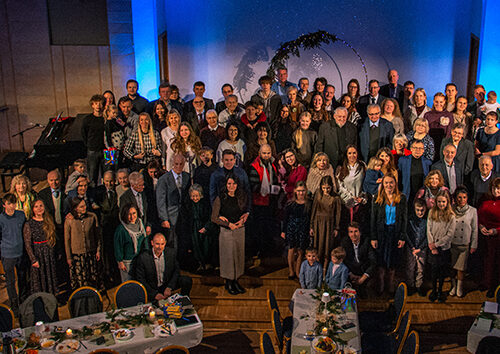12 August 2020 | Budapest, Hungary [ADRA Hungary]
During the COVID-19 pandemic, more than 560 low-income families received food packages and 24 families received laptops for online education thanks to projects sponsored by the Adventist Development and Relief Agency (ADRA) in Hungary.
ADRA’s Quarantine Courier project provided nonperishable food, cleaning supplies and toiletries to low-income people who found themselves in crisis during the country’s lockdown.
“We realised that many families were in trouble because at least one of the parents had lost their job because of the pandemic,” says Zoltán Sitkei, country director for ADRA in Hungary. “We got requests for aid from other non-governmental organisations and local municipalities in various areas of the country. Seeing the great need, we started a fundraising campaign, and the financial resources of ADRA in Hungary were concentrated on this project.”
ADRA recruited 32 volunteers, primarily from Seventh-day Adventist churches, to help purchase, transport, assemble and distribute the food packages. In the town of Nyírcsászári in eastern Hungary, for instance, volunteers from three Adventist churches, as well as from the community, gathered to pack 100 bags with essential supplies and deliver them to the homes of people in need. So far seven communities have received emergency aid from ADRA during the pandemic.
“Our volunteers in the Quarantine Courier programme are real everyday heroes,” says Sitkei. “If it wasn’t for them, this programme that helped hundreds of families couldn’t have been created.”
ADRA also focused on helping students continue their education despite the disruptions caused by COVID-19. In mid-March, when all schools in Hungary closed and had to transition to digital education, ADRA recognised that low-income students would suffer. “Access to e-learning was a problem for many families because they had no suitable phone, tablet or computer to use,” says Sitkei.
ADRA in Hungary immediately began raising funds to purchase laptops that students could use to participate in online education. By the end of the second week of the school shutdown, ADRA had shipped refurbished laptops to schools in three counties. The schools distributed the laptops to disadvantaged students, who used them throughout the school year and then returned them to the school.
After receiving further donations of funds and equipment, ADRA was able to provide a total of 24 laptops to students in six communities. In many families several children used the machine, multiplying the impact of the programme.
 One of the students who received a laptop was Jasmine, who has been battling cancer for three years and cannot attend school. Her parents had spent all their financial resources on Jasmine’s medical care and were unable to afford a computer for her education. Now, thanks to ADRA’s ‘Learn at Home’ programme, she can connect with her teachers and classmates more easily during her lengthy isolation.
One of the students who received a laptop was Jasmine, who has been battling cancer for three years and cannot attend school. Her parents had spent all their financial resources on Jasmine’s medical care and were unable to afford a computer for her education. Now, thanks to ADRA’s ‘Learn at Home’ programme, she can connect with her teachers and classmates more easily during her lengthy isolation.
“Building digital connectivity in education has long-term benefits, especially for students with chronic illnesses,” says Sitkei. “ADRA’s ‘Learn at Home’ project will enrich each school’s IT fleet and enable students to learn more effectively in future years, not just during the COVID-19 shutdown.”
ADRA, the global humanitarian arm of the Seventh-day Adventist Church, is assisting approximately 2.7 million families in more than 70 countries during the Coronavirus pandemic. ADRA’s emergency relief activities include distributing food, hygiene products and cash vouchers to people in need as well as training frontline workers and providing medical supplies to hospitals serving vulnerable communities. To help with ADRA’s ongoing COVID-19 response, visit adra.org.
ABOUT ADRA
The Adventist Development and Relief Agency (ADRA) is the international humanitarian arm of the Seventh-day Adventist Church serving in 118 countries. Its work empowers communities and changes lives around the globe by providing sustainable community development and disaster relief. ADRA’s purpose is to serve humanity so all may live as God intended. For more information, visit adra.org.
The original article was first published on the ADRA website.
tedNEWS Staff: Victor Hulbert, editor; Deana Stojković, associate editor
119 St Peter’s Street, St Albans, Herts, AL1 3EY, England
E-mail: [email protected]
Website: www.ted.adventist.org
tedNEWS is an information bulletin issued by the communication department of the Seventh-day Adventist Church in the Trans-European Division. Readers are free to republish or share this article with appropriate credit including an active hyperlink to the original article.



